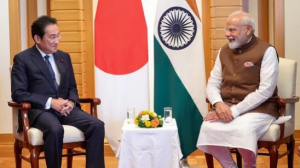 Tokyo : Tokyo : Tokyo, Aug 29, 2025 – Prime Minister Narendra Modi on Friday underscored the growing significance of India-Japan ties, calling the two nations “natural partners” in shaping a peaceful and secure global order. Speaking alongside his Japanese counterpart, Prime Minister Shigeru Ishiba, Modi highlighted that the partnership goes beyond bilateral interests and carries implications for global stability.
India-Japan Partnership for Global Peace
During a joint press briefing in Tokyo, PM Modi said that India and Japan, as two large democracies and leading economies, have a shared responsibility to work together for a better future.
“Our discussions today were productive as well as purposeful. We agree that as the two largest economies of the world and living democracies, our partnership is essential not just for the two countries but also for global peace and security. Strong democracies are natural partners in shaping a better world,” he said.
The leaders reaffirmed their commitment to strengthening ties in areas including defense, technology, and innovation, while also expanding cooperation in new-age sectors such as artificial intelligence (AI) and digital connectivity.
New Decade-Long Roadmap
PM Modi described the discussions as a step towards “a golden chapter” in India-Japan relations. “Today, we have laid the foundation of a new and golden chapter in our special strategic and global partnership. We have charted a roadmap for the next decade. At the center of our vision lie investment, innovation, economic security, environment, technology, health, mobility, and people-to-people exchanges,” he said.
This roadmap aims to not only enhance bilateral cooperation but also set the tone for Indo-Pacific stability and growth.
Japan to Invest 10 Trillion Yen in India
One of the most significant announcements from the visit was Japan’s commitment to invest 10 trillion Yen (approximately USD 66 billion) in India over the next ten years. This investment will particularly focus on connecting small and medium enterprises (SMEs) and start-ups from both nations, fostering joint ventures, innovation, and cross-border entrepreneurship.
PM Modi emphasized that this initiative will strengthen economic security and provide new opportunities for businesses in emerging fields.
Focus on High Technology and Rare Earths
The two leaders also announced cooperation in semiconductors and rare earth minerals, sectors that are increasingly vital for technological advancement and supply chain resilience. With growing global demand for electronics and renewable energy, India and Japan see collaboration in these areas as crucial for both strategic autonomy and sustainable growth.
Additionally, the partnership will advance Digital Partnership 2.0 and an AI Cooperation Initiative, reinforcing joint efforts in cutting-edge technologies.
Strengthening Defense and Innovation Ties
Defense cooperation was another major highlight of the talks. Both countries agreed to deepen collaboration in the defense industry, aiming to co-develop and co-produce advanced systems. Innovation-driven collaboration is also on the agenda, with a focus on research, joint training programs, and capacity building.
Looking Ahead
The Modi-Ishiba meeting marks a reaffirmation of India and Japan’s “Special Strategic and Global Partnership,” a relationship that has grown steadily over the past decade. By aligning investments, innovation, and security cooperation, both countries are positioning themselves as key players in shaping the Indo-Pacific’s future.
As Modi put it, the relationship is not confined to the bilateral space but is a partnership with global relevance — one where two strong democracies work together to build a safer, more prosperous, and technologically advanced world. |